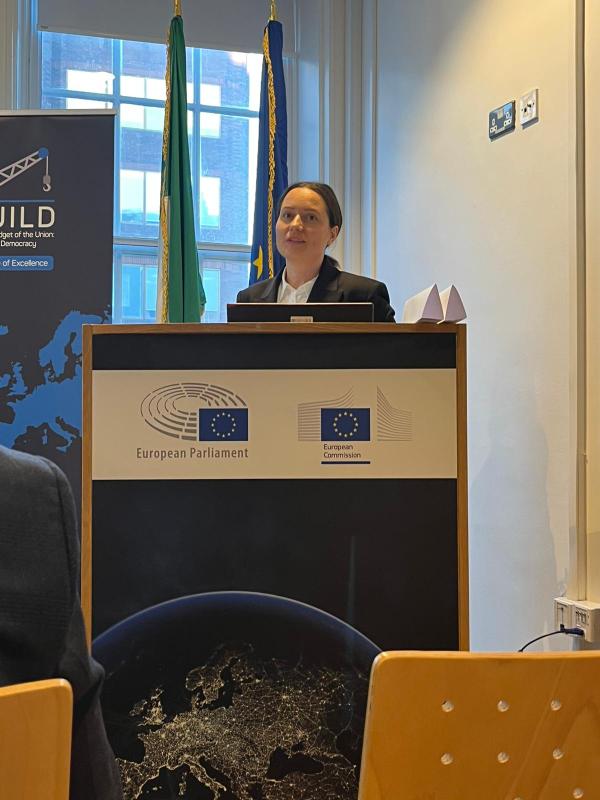BACK TO RESEARCH WITH IMPACT: FNR HIGHLIGHTS
The rapidly evolving risk landscape financial institutions navigate has brought uncertainty and a risk, making them vulnerable to misconduct and oversight. Researchers are uncovering the behavioural risks that drive misconduct in the banking and finance sector in a bid to offer insights into the “how and why” behind unethical decisions.

Geopolitical tensions, climate-related challenges, digitalisation shape the risk landscape that financial institutions are navigating.
“These developments not only increase uncertainty but also heighten the risk of misconduct, compounding existing pervasive weaknesses in governance and oversight. The need for effective strategies to mitigate behavioural vulnerabilities is more urgent than ever,” explains lawyer and researcher Anna Machura-Urbaniak, who successfully defended her PhD at the University of Luxembourg in January 2025.
“My research investigates the psychological drivers underlying misconduct in the banking and financial sector, aiming to shed light on the often-overlooked behavioural factors that influence unethical decision-making. ”Anna Machura-Urbaniak Lawyer and researcher
Understanding what leads to unethical behaviour
Anna’s research is important groundwork in the effort to comprehend the limitations of the current approach to misconduct in the financial sector. By shedding new light on how unethical behaviour actually happens, the research indicates the need for a shift in the EU’s strategy.
The research takes an in-depth look at the existing EU legal framework, investigating if and whether behavioural science has been incorporated into regulation to date. The study identifies critical gaps in current policies and regulatory practices by combining legal analysis with insights from psychology and behavioural ethics.


Unconscious processes rather than malice
The behavioural ethics approach uncovers that unethical behaviour is often not a result of intentional malice, but rather borne out of unconscious processes and intuitive reasoning.
“The empirical literature elucidates various psychological mechanisms that drive people to engage in misconduct. For example, choice framing can encourage self-interest when decisions are framed economically rather than ethically, goal- setting may reduce cooperation and foster deception among peers while euphemistic language may normalize unethical practices.”
“Traditionally, EU regulations have sought to prevent misconduct by setting clear rules and enforcing them through strict penalties —based on the assumption that financial professionals act as rational decision-makers.”
Factors such as in-group bias, cognitive depletion, as well as time pressure and stress further undermine ethical decision-making.
“However, insights from psychology and behavioural science challenge this view and provide evidence that this is an overly simplistic understanding of human behaviour. In reality, decision-making is often influenced by unconscious biases, social pressure, emotional responses, job stressors, and a range of psychological mechanisms that can lead even well- intentioned individuals to cross ethical boundaries. Drawing on these insights, this project identifies the behavioural drivers of misconduct and emphasizes the need to rethink how conduct risks are addressed. ”Anna Machura-Urbaniak Lawyer and researcher
Implementation: A custom approach rather than one-size-fits-all
Implementing the recommendations from the research has its challenges, for example due to the context-dependent nature of the insights, as well as the complexity of translating findings into policies that can be broadly applied. Anna explains that the diverse biases and psychological mechanisms are often situation-specific, which makes it tricky to “one-size-fits-all” policy rule. Therefore, the best approach is a customised one: Addressing specific behaviours within a designated institution or context.
“While behavioural insights offer valuable perspectives, their reliance on laboratory experiments raises questions about their real-world applicability. Observed effects may not always persist in institutional settings, where other incentives and biases may also influence behaviour. Furthermore, participants in these studies are not always representative of the population targeted by policy interventions. As a result, more research is needed to test whether specific findings hold true in the context of financial institutions.”

Protecting consumers and integrity of financial system
Anna’s thesis advances practical recommendations for how EU lawmakers could take a behavioural approach to financial regulation. This would have a number of beneficial outcomes, such as strengthening ethical decision-making, improving long-term compliance. Down the line, this would protect both consumers as well as the integrity of the financial system.
“In the long run, this new approach suggested within this research contributes to more effective regulation, a more trustworthy financial sector, and better outcomes for society as a whole.”
“My follow-up postdoctoral project will focus on the practical application of these recommendations. Collaboration, for example with industry will be essential in this next phase, allowing for co-creation of tools, testing of ideas in real-world settings, and ensuring that the proposed frameworks are both effective and implementable in practice. ”Anna Machura-Urbaniak Lawyer and researcher
Anna Machura-Urbaniak has just completed her AFR PhD at the University of Luxembourg, supervised by Prof. André Prüm.
MORE ABOUT ANNA MACHURA-URBANIAK
Describing her research in one sentence
“My research uncovers the behavioural risks that drive misconduct in the banking and finance sector, offering new insights into how and why unethical decisions occur.”
On her research, peer to peer
“The key contribution of my research is the thesis that a shift in the current approach to misconduct is necessary. The findings show that the EU places excessive emphasis on rationality and deliberate thinking, while insufficiently addressing the psychological, social, and contextual factors that can lead ordinary individuals to engage in questionable practices.”
“Another key outcome of the project is its analysis of how behavioural insights have been integrated into EU financial regulation. While some progress has been made, regulation still largely assumes rational decision-making. Efforts have focused on consumer behaviour, addressing issues like cognitive overload and status quo bias through simplified disclosures, cooling-off periods, and bans on default consent. However, there remains significant potential for expansion. The research calls for modernizing disclosures using visually appealing, interactive, and multimodal formats to better support consumer understanding, especially online.”
On her scientific background
“I’m a legally trained researcher driven by curiosity and a commitment to bridging disciplines to solve real-world problems. I come from legal practice, having worked for several years as an attorney-at-law in law firms in Luxembourg, where I witnessed firsthand how powerful social norms and institutional dynamics can be. I’ve always been passionate about understanding human nature and what drives people to act in a given way. As a lawyer, I naturally seek to explore what responses the law can offer.”
What she loves about science
“I love the endless opportunity to explore and uncover new insights that can drive real-world change. Research allows me to explore various ideas and contribute to solving complex problems. The process of discovering new knowledge and applying it to improve systems, especially in law and finance, is incredibly rewarding.”
Mentor with an impact
“Yes, I have been fortunate to work under the guidance of Prof. Prüm, whose interdisciplinary approach and unwavering support have profoundly shaped my research. His mentorship encouraged critical thinking, academic rigor, and confidence in pursuing innovative ideas, significantly influencing my growth as a scholar.”
Why she chose Luxembourg for her research
“I chose to pursue my research in Luxembourg because, as a leading financial center, it offers a unique environment to explore issues related to the banking and finance sector. The presence of numerous financial institutions, regulatory bodies, and experts provides invaluable insights.”
Where she sees herself in 5 years
“Given my interdisciplinary background in EU banking and finance law, combined with behavioural sciences, I aim to position myself as a leading expert at the intersection of legal research and behavioural insights within financial regulation. In the future, I aspire to be a researcher who not only influences policy but also actively shapes the development of behavioural risk management frameworks and behavioural supervision within the financial sector. My goal is to bridge the gap between legal scholarship and practical, evidence- based solutions that address the root causes of misconduct in financial institutions.”
Related highlights
Spotlight on Young Researchers: Ensuring sustainable water use for Luxembourg
In Luxembourg, nearly one tenth of water consumption happens in agriculture. Changing rainfall patterns and rising irrigation needs during summer…
Read more
Spotlight on Young Researchers – Revisited: From researcher to project manager
When Xianqing Mao was featured in Spotlight on Young Researchers in 2017, she had completed her medical degree and was…
Read more
Spotlight on Young Researchers: Giving robots a more human touch
The use of robots is rising, both in industry and in homes. This is made possible by scientists leveraging artificial…
Read more
Spotlight on Young Researchers: Cancer in older people & the need for a tailored approach
Cancer in adults aged 65+ is increasing, raising pressure on healthcare systems worldwide, creating economic and social burdens for families…
Read more
Spotlight on Young Researchers: An eco-friendlier approach to plastics
Polyurethanes (PUs) are widely used plastics, produced in large quantities each year, and found in products like foams, coatings, sporting…
Read more
Spotlight on Young Researchers: Adapting Earth technologies to function on the Moon
Over 50 years after the first Moon landing, interest is growing in returning. What was the case in the 1960s…
Read more